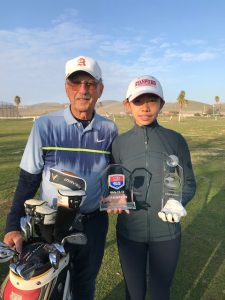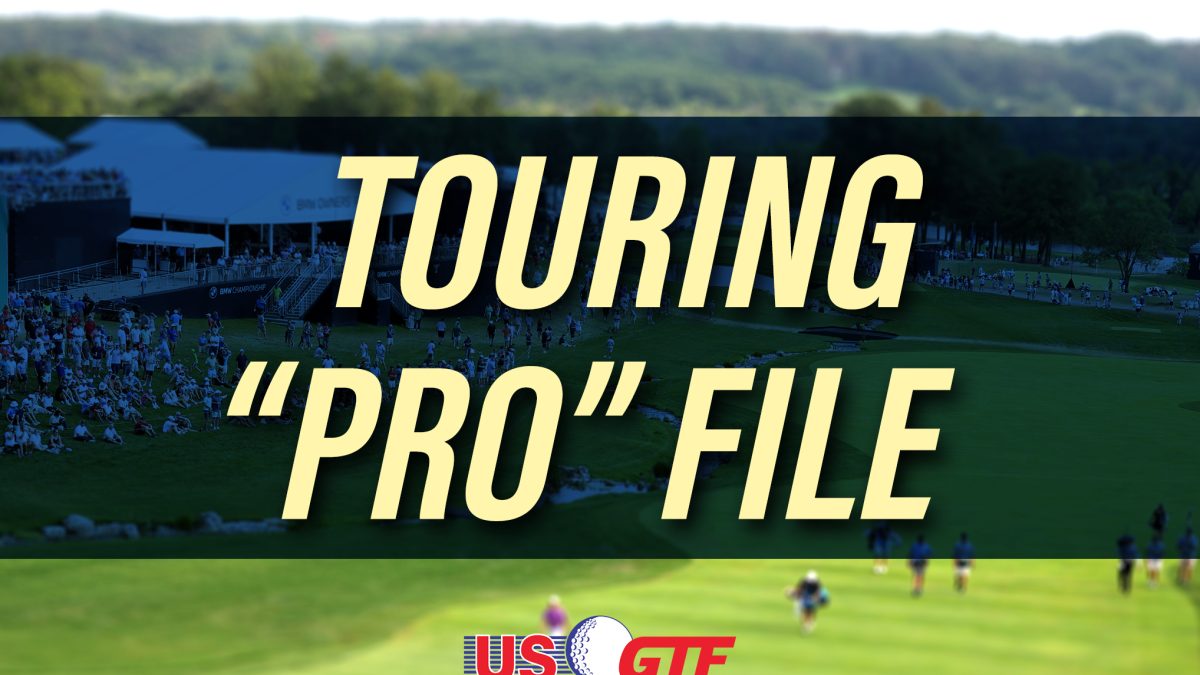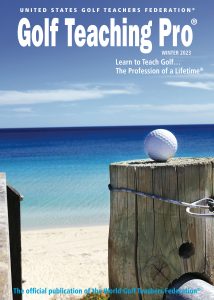Swing Profile Golf App Now Available On Mac Laptop
 Coaches can now run the Swing Profile golf app on a Mac (minimum M1) and analyze student videos captured on the Mac or mobile devices such as iPhone and iPad. The Mac version offers convenience of keyboard and large screen, making it easier to type out comments or record voice-over for students. Go to app store and download for free now!
Features of the Swing Profile golf app for coaches include:
Coaches can now run the Swing Profile golf app on a Mac (minimum M1) and analyze student videos captured on the Mac or mobile devices such as iPhone and iPad. The Mac version offers convenience of keyboard and large screen, making it easier to type out comments or record voice-over for students. Go to app store and download for free now!
Features of the Swing Profile golf app for coaches include:


 By Walt Abraham, USGTF Master, Walnut Creek, CA
Jayleen Sito started taking lessons from me at age 7 as a beginner. She has progressed through the years because of her love for the game. At each age starting at 10, she has been one of the top golfers in her age group in Northern California. She finished 2nd in the points standings in 2021 and was invited to the U.S. Kids Golf World Championship in Pinehurst, North Carolina, where she finished in the top 30 and again in 2022, where she finished in the top 25.
She has won numerous tournaments during the last few years on the U.S. Kids Tour, Junior Tour Northern California and the American Junior Golf Association. This year, she has won the JTNC Invitational in June, the U.S. Kids NorCal regional, and recently took first place in the U.S. Kids Monterey Championship at 3-under par, while also taking bronze medalist honors in the second tournament of the week
Jayleen is one of the nicest young ladies around. She is also competitive and dedicated and is always the one wanting to do more, and will shortly be giving back by helping younger children with no experience get into golf through her mother’s school program. She is a fine example of what makes golf a great game.
By Walt Abraham, USGTF Master, Walnut Creek, CA
Jayleen Sito started taking lessons from me at age 7 as a beginner. She has progressed through the years because of her love for the game. At each age starting at 10, she has been one of the top golfers in her age group in Northern California. She finished 2nd in the points standings in 2021 and was invited to the U.S. Kids Golf World Championship in Pinehurst, North Carolina, where she finished in the top 30 and again in 2022, where she finished in the top 25.
She has won numerous tournaments during the last few years on the U.S. Kids Tour, Junior Tour Northern California and the American Junior Golf Association. This year, she has won the JTNC Invitational in June, the U.S. Kids NorCal regional, and recently took first place in the U.S. Kids Monterey Championship at 3-under par, while also taking bronze medalist honors in the second tournament of the week
Jayleen is one of the nicest young ladies around. She is also competitive and dedicated and is always the one wanting to do more, and will shortly be giving back by helping younger children with no experience get into golf through her mother’s school program. She is a fine example of what makes golf a great game.
 Thomas Parkin from Santee, California, was drawn towards golf at the age of 4 and started playing more seriously at age 9, often playing 36 to 54 holes a day during the summer. After graduating from Sheffield Hallam University in Sheffield, England, he married Chrissy, now his wife of 13 years, that same year.
Chrissy, who was an Olympic-level ice dancer, inspired him to do what he loved and led him to work in the golf industry. The next year, they relocated to San Diego, California, where he began his golf coaching career. He has successfully run his own golf school for seven years at two different courses; served as a swing coach to a high school team which lead to their rapid improvement, and coached junior golfers who competed in the Junior World championship.
He and Chrissy have a four-year-old son, Caleb, who loves to work on his golf game. Interestingly, he also had a successful career on the side as a wedding and events deejay. Other business ventures include starting an online health and fitness blog and YouTube channel with his wife, personal training, and music production. He is currently in the process of launching a golf YouTube channel.
Thomas Parkin from Santee, California, was drawn towards golf at the age of 4 and started playing more seriously at age 9, often playing 36 to 54 holes a day during the summer. After graduating from Sheffield Hallam University in Sheffield, England, he married Chrissy, now his wife of 13 years, that same year.
Chrissy, who was an Olympic-level ice dancer, inspired him to do what he loved and led him to work in the golf industry. The next year, they relocated to San Diego, California, where he began his golf coaching career. He has successfully run his own golf school for seven years at two different courses; served as a swing coach to a high school team which lead to their rapid improvement, and coached junior golfers who competed in the Junior World championship.
He and Chrissy have a four-year-old son, Caleb, who loves to work on his golf game. Interestingly, he also had a successful career on the side as a wedding and events deejay. Other business ventures include starting an online health and fitness blog and YouTube channel with his wife, personal training, and music production. He is currently in the process of launching a golf YouTube channel.


 Every two years, the World Golf Teachers Federation names its Top Teachers, and the list for 2022-23 has been released. The list can be found in the new edition of Golf Teaching Pro magazine, the official member publication of the USGTF and WGTF as well as online at
Every two years, the World Golf Teachers Federation names its Top Teachers, and the list for 2022-23 has been released. The list can be found in the new edition of Golf Teaching Pro magazine, the official member publication of the USGTF and WGTF as well as online at  From everyone at the USGTF National Office, we wish you a Happy New Year and hope you have a prosperous and successful 2023 season. As the USGTF enters its 34th year of operation, the National Office staff is ready to serve you, and we welcome your input. Please contact
From everyone at the USGTF National Office, we wish you a Happy New Year and hope you have a prosperous and successful 2023 season. As the USGTF enters its 34th year of operation, the National Office staff is ready to serve you, and we welcome your input. Please contact  By: Mark Harman, Director of Education
The biggest news to hit the golf world in 2022 was the creation of the LIV Golf Tour. With Greg Norman as its commissioner, LIV drew a few of the biggest names in golf away from the PGA Tour, most notably Dustin Johnson, Bryson DeChambeau, Brooks Koepka, Patrick Reed, Phil Mickelson and Cameron Smith.
While the USGTF’s official position on LIV Golf is one of neutrality, it can be stated with certainty that the new venture will continue to be a presence in 2023. Many people have a problem with the source of the funding for the new tour – the Saudi Arabian government’s Public Investment Fund, while others have pointed out that many American corporations and even our government do business with Saudi Arabia. Both sides have valid arguments.
I have watched a few of the tournaments on YouTube, and the production is somewhat different from that of the PGA Tour’s. A “pylon” on the left side of the screen continually updates with the position of the players, and many shots are shown. There is also a team aspect to the tournaments, which to me seems somewhat of a gimmick, but the players have apparently bought into it.
I personally don’t understand the PGA Tour suspending players who went to LIV. I would love for someone to ask commissioner Jay Monahan how it benefits the PGA Tour that the above-mentioned players are no longer allowed to compete on that tour. At any rate, it seems the LIV Tour is here to stay for at least another year or two, if not longer. Golf’s other entities need to come to grips with this fact and find a way to coexist.
By: Mark Harman, Director of Education
The biggest news to hit the golf world in 2022 was the creation of the LIV Golf Tour. With Greg Norman as its commissioner, LIV drew a few of the biggest names in golf away from the PGA Tour, most notably Dustin Johnson, Bryson DeChambeau, Brooks Koepka, Patrick Reed, Phil Mickelson and Cameron Smith.
While the USGTF’s official position on LIV Golf is one of neutrality, it can be stated with certainty that the new venture will continue to be a presence in 2023. Many people have a problem with the source of the funding for the new tour – the Saudi Arabian government’s Public Investment Fund, while others have pointed out that many American corporations and even our government do business with Saudi Arabia. Both sides have valid arguments.
I have watched a few of the tournaments on YouTube, and the production is somewhat different from that of the PGA Tour’s. A “pylon” on the left side of the screen continually updates with the position of the players, and many shots are shown. There is also a team aspect to the tournaments, which to me seems somewhat of a gimmick, but the players have apparently bought into it.
I personally don’t understand the PGA Tour suspending players who went to LIV. I would love for someone to ask commissioner Jay Monahan how it benefits the PGA Tour that the above-mentioned players are no longer allowed to compete on that tour. At any rate, it seems the LIV Tour is here to stay for at least another year or two, if not longer. Golf’s other entities need to come to grips with this fact and find a way to coexist.

 Just in time for the holidays! USGTF is pleased to announce a new travel partner to offer discounts to our members for lodging and rental cars worldwide.
Members can save up to 65% at over 1,000,000 hotels, resorts, condo rentals, bed ‘n’ breakfast inns, corporate housing and rental homes worldwide. Corporate and Group lodging is also available. Check it out today at
Just in time for the holidays! USGTF is pleased to announce a new travel partner to offer discounts to our members for lodging and rental cars worldwide.
Members can save up to 65% at over 1,000,000 hotels, resorts, condo rentals, bed ‘n’ breakfast inns, corporate housing and rental homes worldwide. Corporate and Group lodging is also available. Check it out today at